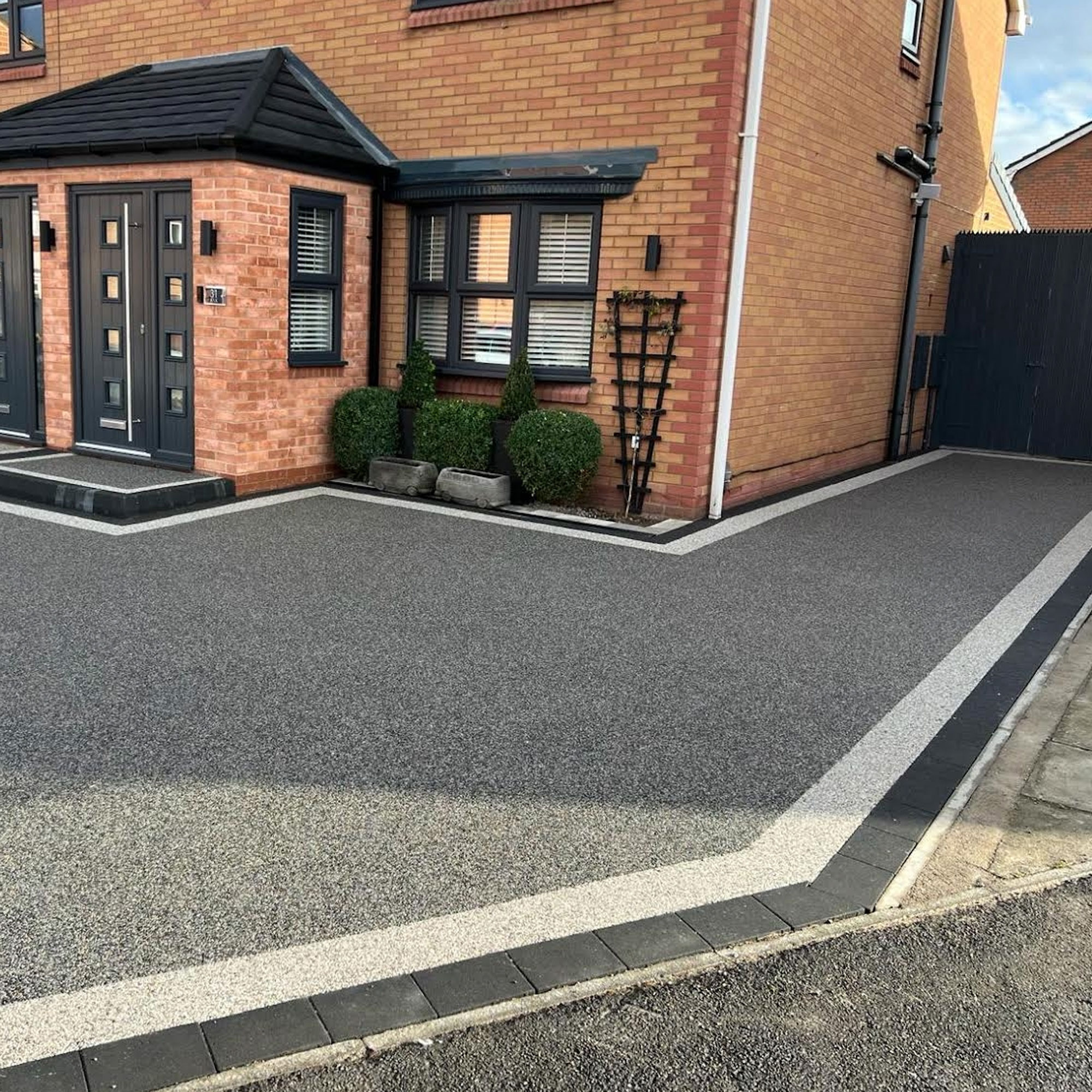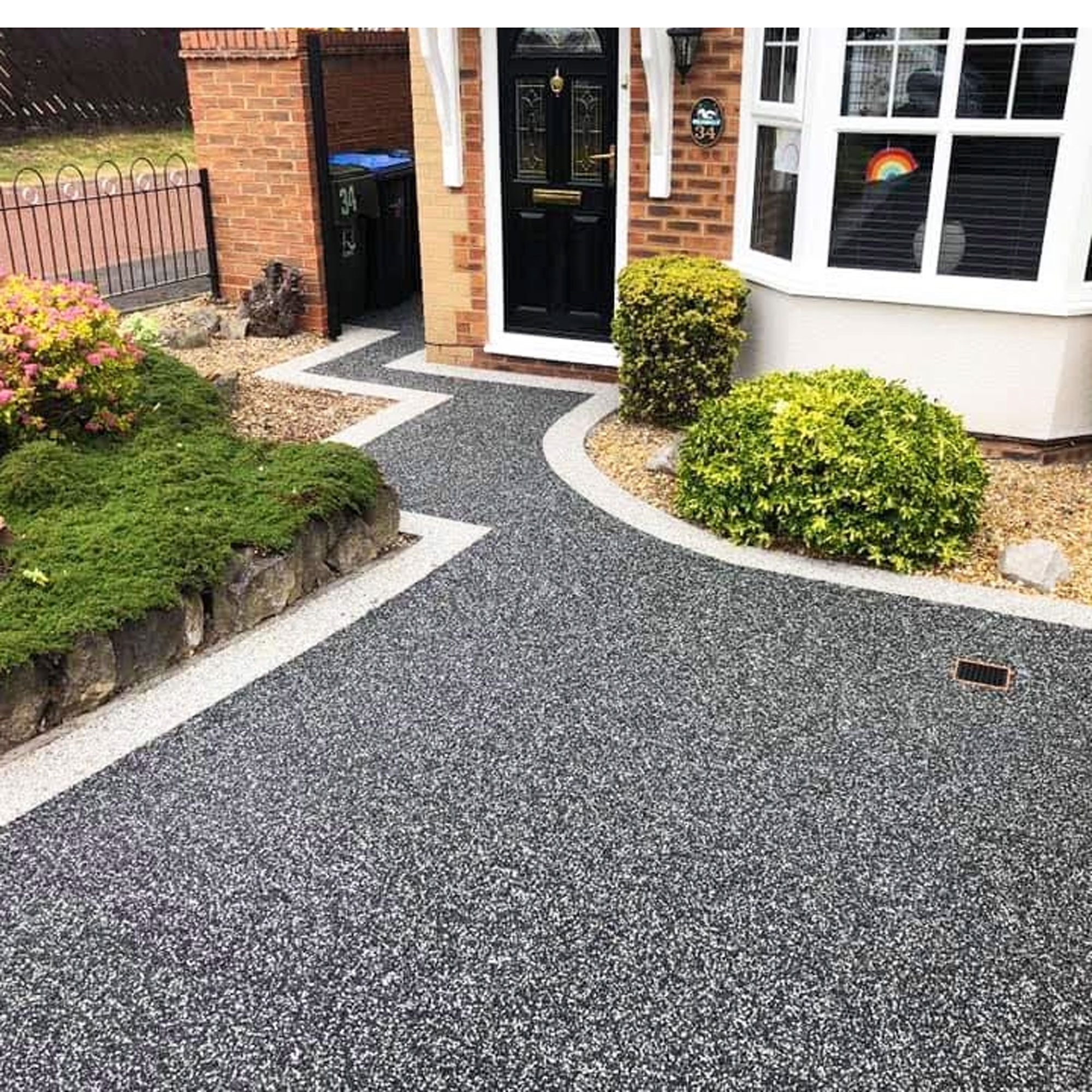
Just what are the disadvantages of resin driveways? This is fast becoming one of the most popular materials used to finish off some of the smartest driveway ideas around, but many homeowners are still unsure of its downsides.
'Resin driveways are becoming increasingly popular as an option, with the possibility of an attractive, contemporary finish with high values of permeability that are particularly valuable for managing surface water within domestic UK homes,' explains Farook Member, director and home improvement expert at QS Supplies.
While resin is not necessarily a brand new offering in terms of driveway materials, they are still viewed with a little suspicion by some, particularly when compared to good old gravel and block paving. With that in mind, our guide delves into the disadvantages of resin, as well, of course, as explaining its many plus points.
What are the disadvantages of resin driveways?

Before extolling the virtues of resin driveways, it is sensible to make yourself aware of the factors that put some people off using this as a driveway material.
The experts we spoke to agreed that one of the main downsides of resin driveways lies in its trickier-than-average installation process – in short, this is not really a weekend DIY project, unlike, say, laying gravel driveways.
'Professional installation is required to guarantee the appropriate bonding and finish, which may cost you more – plus it adds to the overall complexities,' picks up Daniel Wickham, owner of First Impression Driveways.
'Resin laying is trickier than some people make it out to be,' agrees Farook Member. 'It requires a well-constructed underlying surface such as concrete or tarmac, and must be laid in dry weather in order to set correctly. Get it wrong and you're risking cracking or poor bonding.'
Cost is another factor that puts some people off. 'The price of resin bound gravel can be as much as £200/m² in certain parts or if there's a lot of groundwork to be done,' reveals landscaping and driveway expert Guy Wall of GCL Products.
Other disadvantages Daniel Wickham warns of include:
- Cost: 'Depending on quality and installation, resin driveways can be more expensive than other materials such as gravel or basic asphalt,' explains Daniel.
- UV stability: If the resin is not UV stable it can yellow over time, potentially ruining the look of the driveway.
- Temperature sensitivity: In extremely hot climates resin may become slightly flexible, but good quality resins are tested to withstand most average temperatures.
- Installation: You need to have them professionally installed for rock hard, long lasting results. DIY efforts may result in uneven surfaces or inadequate drainage.
Do the pros outweigh the cons?

Despite the downsides, there are plenty of advantages to resin bound gravel driveways which, most people agree, outweigh the cons.
'One of the biggest advantages is that they are extremely low-maintenance in nature,' explains Farook Member.
Their hands-free nature might make it less necessary for homeowners to have to look into how to prepare a driveway for winter, but there are other positives to this material which make it a worthwhile investment too. These include:
- Longevity: 'With the correct maintenance, resin driveways have the potential to last as long as those constructed from materials such as concrete or asphalt – which is generally about 15 to 20 years,' reveals Daniel Wickham.
- Design choices: Resin is perfect for contemporary homes and offers a great deal of flexibility when it comes to colour and finish.
- Low maintenance: As mentioned above, one of the main draws of resin driveways how easy they are to look after. 'There is no weed growth and loose gravel is of no concern,' points out Farook Member.
- Planning permission not (usually) required: Driveway planning permission will usually not be required providing you are using a permeable material to cover it – and most resins tick this box. But do check before parting with any money.
Is a resin driveway a good idea?
There are lots of good reasons to choose a resin bound gravel driveway, not least that they are a great lay-it-and-forget-about-it option. If you are after a maintenance-free driveway, this is a material you should strongly be considering – no need for laboriously cleaning gravel here.
Resin driveways are also perfect for homeowners keen to inject a little contemporary kerb appeal into their home. They are sleek and minimalist and come in all kinds of shades to tie in with your any kind of facade, be that a clean white render or an inky blue timber cladding.
That said, if your home is a little more traditional in style, it may well be better suited to a different finish, such as stone, gravel or weathered block paving.
Additionally, if you are on a tight budget, this is not necessarily going to be the right choice for you.
'Resin driveways are pricier than gravel but comparable with high-spec block paving in cost,' advises Farook Member. 'They average between £50 to £70 per metre square.'
FAQs
What is a resin driveway?
This is actually a really important to question to ask. First off, you need to be aware that there is a difference between a 'resin-bound' driveway and one that is 'resin-bonded'. This could affect whether or not you will need to apply for planning permission for your new installation.
Resin-bonded systems are formed when aggregate is distributed onto a surface to which the resin has already been applied. This gives a non-permeable surface finish, meaning planning permission is likely to be required if the driveway is over 5/m2.
Resin-bound driveways, on the other hand, are comprised of small aggregate stones that are combined with resin before being applied to the surface together. This results in a permeable finish, meaning planning permission is unlikely to be required. They also result in a smoother finish with less chance of loose stones.
How long do resin driveways last?
One of the most impressive things about resin driveways is their expected lifespan.
'A good quality resin-bound driveway lasts between 15-20 years,' reveals Farook Member. 'This is the same length of time as block paving, but with minimal maintenance.'
What are resin driveway maintenance requirements?
Another irresistible draw for many homeowners when it comes to resin driveways is how 'hands-off' they are in terms of the looking after they require – one less thing to add to your winter home maintenance checklist each year.
'Resin surfaces are not difficult to clean or maintain and are also very effective at knocking back weeds and stopping stains,' explains Daniel Wickham.
It is important to bear in mind though that high-quality products and professional installation are both key to a long-lasting resin driveway.
One of the best things about resin driveways is how low-maintenance they are. However, it never hurts to give your driveway a little spruce-up from time to time so why not look into how to clean a patio without a pressure washer to keep your new approach in tip-top condition?







